Key takeaways:
- Participating in elections fosters a sense of community and civic duty among Filipinos.
- Access to reliable news sources is crucial for informed voting and combating misinformation.
- Preparation and organization before election season can alleviate stress and enhance understanding of candidates and issues.
- Fact-checking and engaging with diverse perspectives help cultivate informed citizenship and critical thinking.
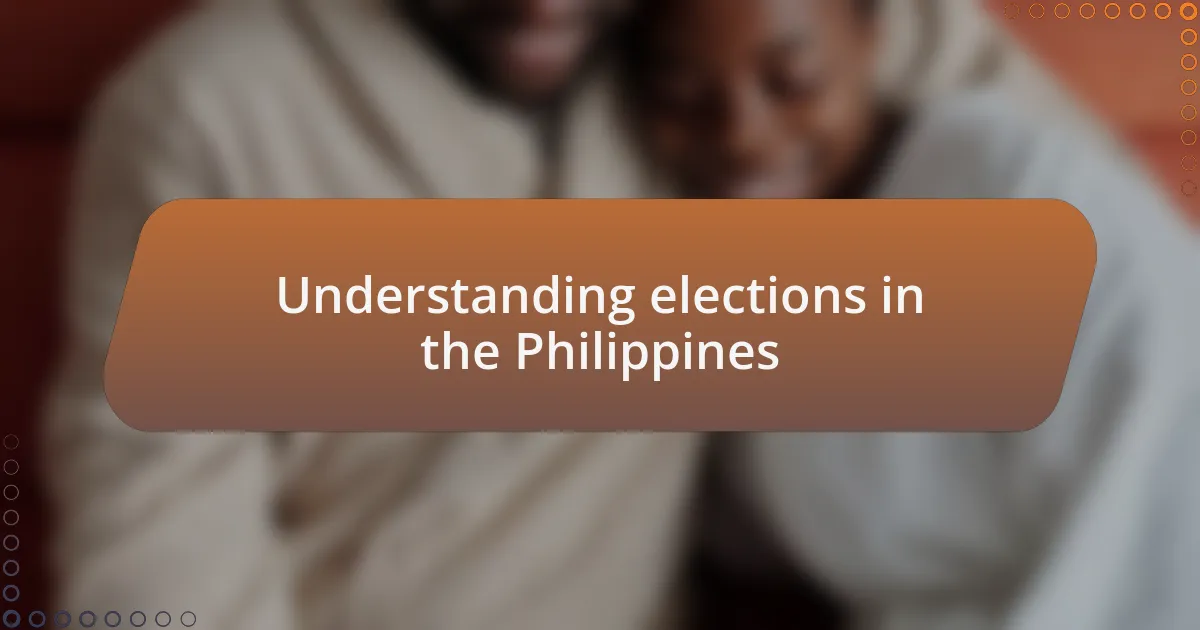
Understanding elections in the Philippines
Elections in the Philippines are more than just a political process; they are a vibrant display of democracy that captures the heart of every Filipino. I still remember my first voting experience; the excitement and nerves mingling as I stood in line, knowing I was part of something larger. Isn’t it fascinating how a single vote can shape our future and reflect our collective aspirations?
The electoral system here is a mix of direct and indirect democracy, where citizens elect officials at various levels, from baran (village) leaders to the president. It’s easy to overlook the intricacies involved, but every aspect matters. Have you ever thought about how local issues often influence national conversations? I have seen time and again how grassroots movements can ignite change, igniting my passion for participation.
Campaign season feels like a festival, with candidates using creative ways to engage the public. I’ve witnessed the dedication of volunteers putting up banners and organizing events, channeling the spirit of bayanihan, or communal unity. It’s a poignant reminder that behind the banners are real stories and struggles, all hoping for a brighter tomorrow. How can we not feel a sense of connection and responsibility during such a pivotal moment?
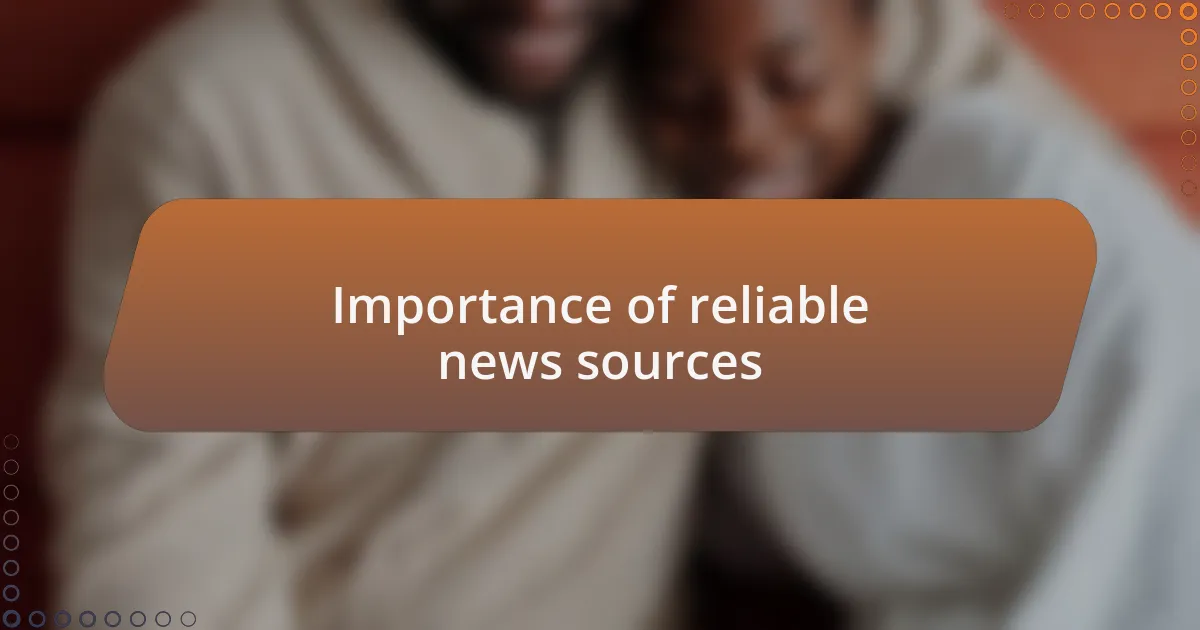
Importance of reliable news sources
Reliable news sources are essential, especially during elections in the Philippines. I recall a time when I stumbled upon misleading information that muddied my understanding of a candidate’s background. The annoyance and confusion I felt remind me just how critical it is to have access to trustworthy news, allowing me to make informed decisions.
The noise of misinformation can often overshadow genuine, factual reporting. Sometimes, I find myself questioning the motives behind skewed narratives; does the source prioritize sensationalism over truth? By tapping into credible outlets, I believe we empower ourselves to rise above the chaos and engage in meaningful discussions about the issues at stake.
Trust in news sources is not just about the headlines; it’s about fostering an informed electorate. I often share my insights with friends, encouraging them to verify the facts behind what they read. Together, we navigate the landscape of information, recognizing that informed voters are the lifeblood of a vibrant democracy, ensuring our voices resonate in the election process.
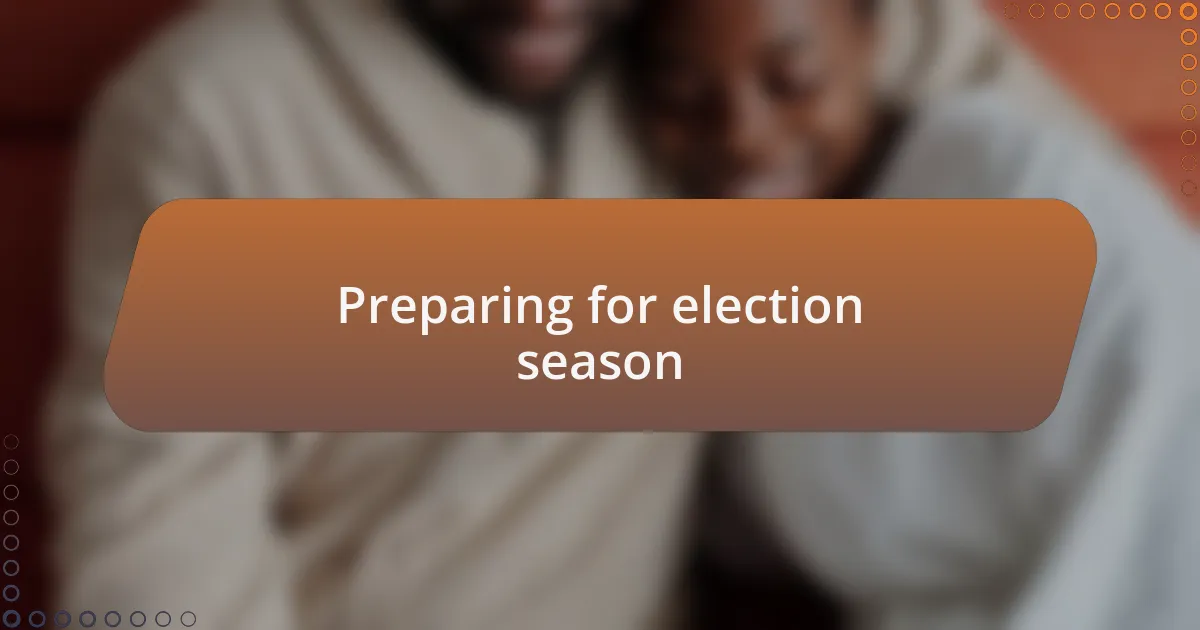
Preparing for election season
As election season approaches, I find it’s essential to start gathering my resources early. Last year, I set aside a weekend to research candidates and their platforms systematically. I created a spreadsheet to compare their stances on issues important to me, and honestly, it alleviated so much stress later on. Do you ever feel overwhelmed by the sheer volume of information when elections roll around? I know I do, but having everything organized really helped me focus on what mattered most.
Building a strong support system can also make a difference during election season. I often organize small gatherings with friends to discuss candidates and their proposals. Sharing perspectives not only enriches my understanding but also fosters camaraderie in our civic duties. It’s amazing how a simple coffee chat can turn into a lively debate that brings clarity to our choices.
Finally, familiarizing myself with voting logistics early on is a must. Last election, I almost missed the registration deadline because I assumed I had plenty of time. That little rush of panic taught me to mark key dates on my calendar and double-check my registration status well in advance. Have you ever faced such last-minute scrambles? Trust me, planning ahead makes all the difference come voting day.
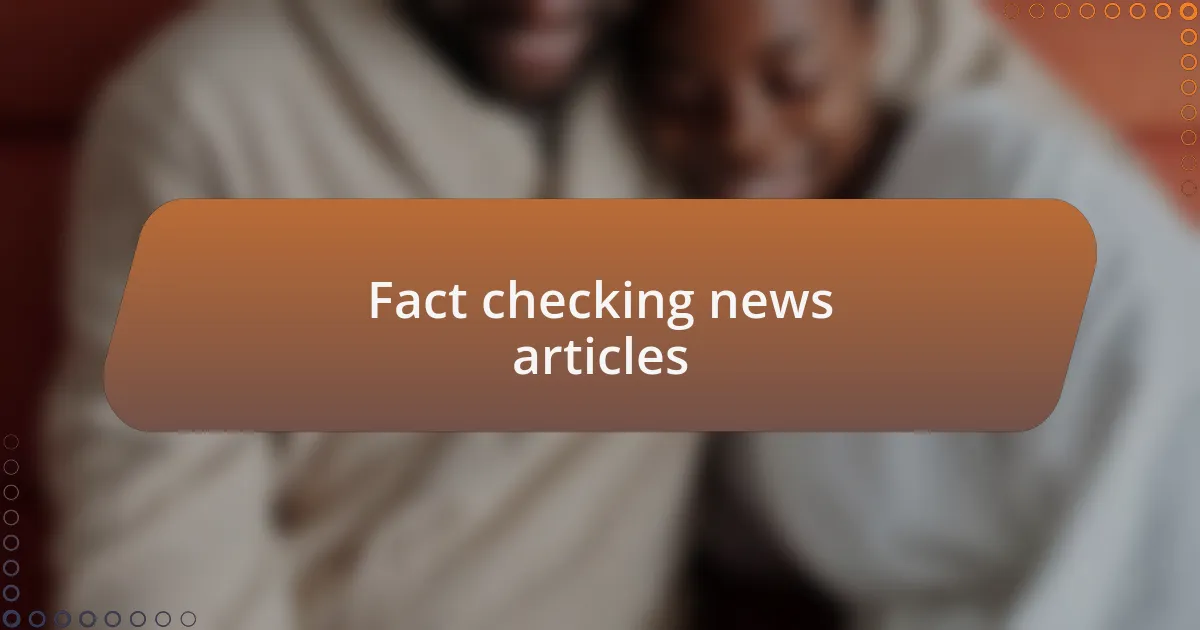
Fact checking news articles
Fact-checking news articles is one of the most crucial steps in preparing for election season. I remember the first time I shared a news article online, only to find out later that the facts were twisted. It felt embarrassing and highlighted how easily misinformation can spread. Have you ever experienced that rush of anxiety, realizing you might have misled others? This is why I always double-check any claims I come across, especially during such a politically charged time.
I typically start my fact-checking process by using reliable sources like independent fact-checking websites. I learned this lesson the hard way when I stumbled upon a sensational headline that seemed too shocking to be true. A quick search revealed that the article was based on misleading statistics. Seeing how easily we can be swayed by attention-grabbing headlines reinforces my habit of digging deeper before forming an opinion. When was the last time you questioned a headline?
In my experience, engaging with different news outlets and contrasting their coverage can unveil a more balanced perspective. I once noticed how two differing reports on the same candidate presented completely different narratives. Analyzing these variations not only sharpened my critical thinking but also deepened my understanding of media bias. I often ask myself, how can we expect to make informed decisions without scrutinizing the information we consume? Fact-checking isn’t just about debunking falsehoods; it’s an active effort to cultivate informed citizenship.
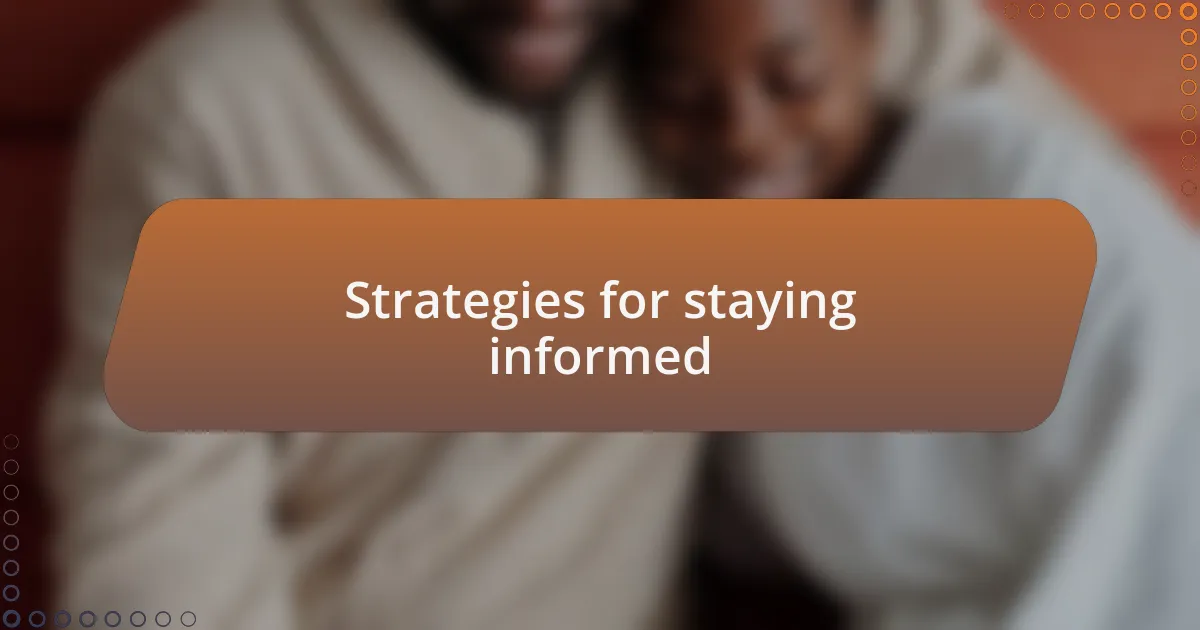
Strategies for staying informed
Staying informed during elections requires a strategic approach, and one of my go-to methods is setting up news alerts. I remember the excitement I felt when I first activated alerts for key topics related to candidates and issues close to my heart. Every time a relevant article popped up, I felt like I was in the loop, ready to engage in conversations with my peers. Have you ever felt that rush of connecting with others over the latest news?
Another effective strategy is following social media accounts of trusted journalists and analysts. I recall scrolling through my feed and stumbling upon a live tweet thread during a candidate debate. The insight shared in real-time gave me a richer understanding than any article could provide afterward. What if you could tap into this immediate intelligence? It’s like having a personal commentator to help dissect the arguments as they unfold.
Additionally, I make it a habit to join local community forums or discussion groups centered around the elections. It was in one of these gatherings that I first heard about grassroots initiatives and local candidates who rarely make the headlines. Engaging face-to-face, or even virtually, allows for a diverse range of opinions that enriches my perspective. How often do we miss out on these invaluable discussions simply by sticking to traditional news sources? By embracing community dialogues, I find I have a more nuanced understanding of what truly matters to fellow voters.
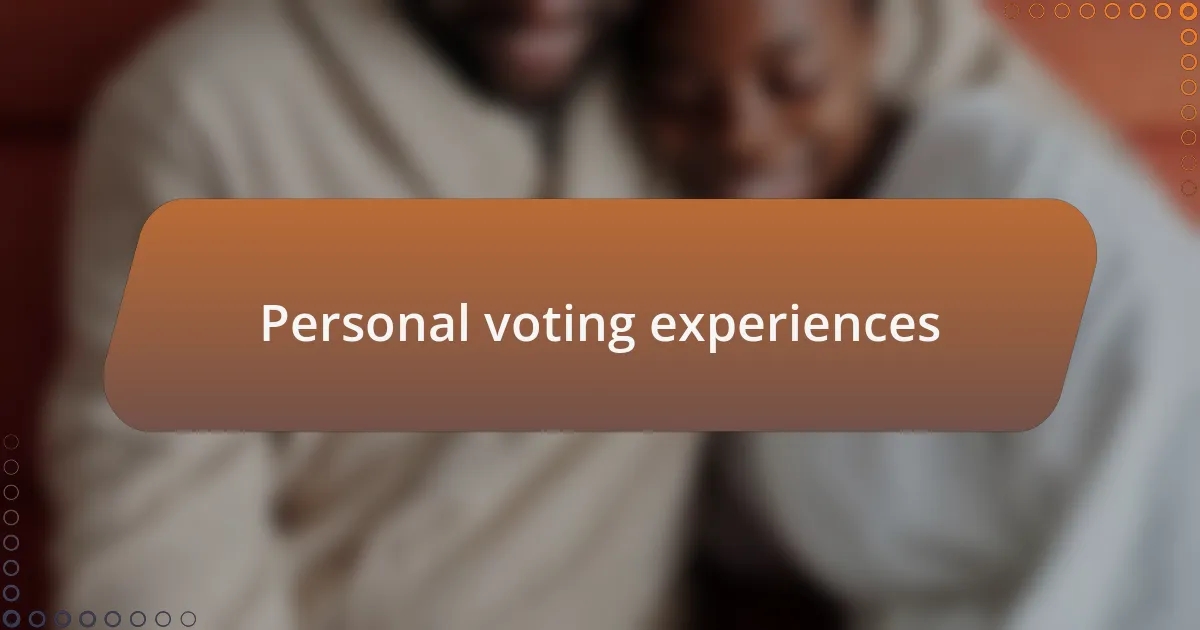
Personal voting experiences
When it comes to my personal voting experiences, I find that preparation makes all the difference. I recall one election day when I printed out a sample ballot and highlighted the candidates I wanted to support. Standing in line, I felt a mix of anticipation and responsibility as I reviewed my choices. Have you experienced that moment when you realize you’re about to make your voice heard?
On another occasion, I decided to bring a friend along to vote. It was heartening to see his excitement, and it sparked a meaningful dialogue about our choices. The act of voting became a shared experience, reminding me of the community aspect of this civic duty. Isn’t it empowering to know we can influence each other’s perspectives?
Lastly, I’ll never forget the moment I cast my vote for the first time. I felt a wave of pride wash over me as I placed my ballot in the box, knowing I was part of something bigger than myself. That day, I truly understood the power of my voice. Can you recall the feeling when you realized that every vote genuinely counts?
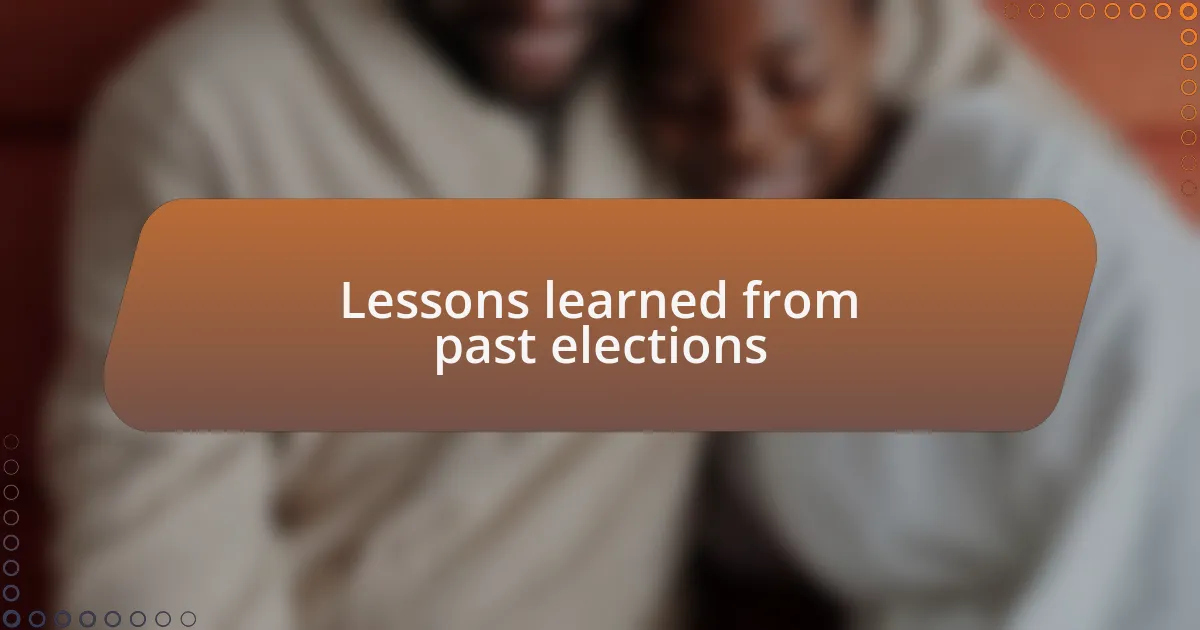
Lessons learned from past elections
Reflecting on past elections, one key lesson I’ve learned is the importance of understanding the issues at stake. I remember a time when I didn’t fully grasp a particular referendum. Later, I realized that my lack of knowledge could have affected my vote. Have you ever felt uncertain about a decision you were about to make? It’s a reminder that educating ourselves on the candidates and their platforms is crucial.
Additionally, the experience of dealing with unexpected challenges at polling places has taught me to remain adaptable. In one election, I arrived only to discover my name wasn’t on the voter list. Initially, I was frustrated, but this led me to advocate for myself and seek out a solution. Have you faced a situation that tested your patience? I learned that sometimes, the process can be as significant as the act of voting itself.
Another significant takeaway has been witnessing the impact of grassroots movements in shaping election outcomes. During a particularly contentious election cycle, I saw how community organizers mobilized young voters, reminding us how our collective voices can create change. Isn’t it inspiring to think about the power of unity in the democratic process? This atmosphere of collaboration can transform an election into a powerful statement of community will.